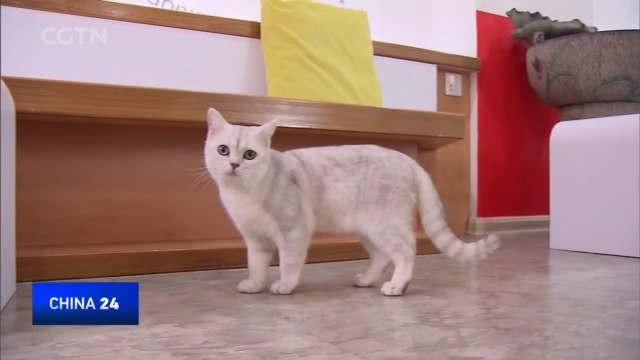
20:43, 04-Oct-2017
Pet Economy: Booming industry inspiring new professions in China

With nearly 1.4 billion people, China has the largest population in the world, and in recent years, the country has also seen a huge rise in the number of domestic pets. As more and more Chinese look for some furry companionship, a booming pet economy has been taking shape to serve them. And not only is this multi-billion dollar industry gaining momentum, it's spawning plenty of indirect business opportunities. Let's take a look.
With pets having essentially become a "vehicle of emotions" for many in China, an increasing number of individuals wish to crystallize the images of their loved companions in pictures and videos, giving rise to the pet photography industry.
CLIENT Taking photos or shooting video with mobile phones or cameras is commonplace nowadays and we use that occasionally. But we don't do as good a job as the professionals. With an environment like this, the finished article is more professional and leaves a better memory.
As the pet market continues to grow, pet owners' mindsets have gradually shifted, with more now looking for more respect for and tolerance of their pets. The vast majority of restaurants prohibit access to pets. But as the pet-friendly concept becomes more widely accepted, more and more start-ups are now offering pets access to dining venues. Hu Lei, CEO of BARKSTARS, tells us his original intention behind founding a dog - friendly restaurant.
HU LEI CEO, BARKSTARS I'll start with my dog, who is 12 years old and has been with us since 2005. We first had it in Canada and took it with us to Beijing in 2009. We took it out for coffee or food a lot but we always faced this problem that lots of restaurants or indoor establishments do not give access to dogs who visit with their owners. Often what we did was put our dog in the car or secured it on a leash by the entrance. But it was not exactly a reassuring solution for us owners. My point is, very few indoor establishments in China grant dogs access to accompany their owners inside.
In the context of "Internet + pet", the pet-sitting sector has broken through as an integral part of the pet economy, and increasing numbers of merchants are transforming to omni-channel pet minding.
LI XIAOLONG PRODUCT DIRECTOR, GOUMIN.COM The O2O pet minding service is an online service platform that connects pet owners in need of a minding service with pet owners who are in a position to provide such a service. Many people have demand for pet minding online because they do not wish to entrust their pets to a pet store or an agency.
Another new initiative is chauffeur-driven vehicles for dogs, with public transportation in its current form not exactly being pet-friendly, and taxi drivers tending to frown upon the idea of transporting pets. Dogbus is one such canine transportation startup.
XIE SENXIANG CTO, DOGBUS In the early days of Dogbus, the industry was in our favor in some aspects. Firstly, pet owners had more disposable income. When a country has money and time, it will have an established services sector and this includes pet services. So when the industry and business prosper and time is of the essence, and we need to take our dog to the salon, the vet, or the airport, dogs will need a ride. Our chauffeur-driven car for pets was conceived to address this need.
Statistics from China's National Bureau of Statistics indicate that the compound annual growth rate of China's pet industry was 49.1 percent between 2010 and 2016, and the size of the pet market reached 122 billion RMB in the year 2016 alone. By 2020, China's pet economy is expected to be valued at over 200 billion RMB.

SITEMAP
Copyright © 2018 CGTN. Beijing ICP prepared NO.16065310-3
Copyright © 2018 CGTN. Beijing ICP prepared NO.16065310-3